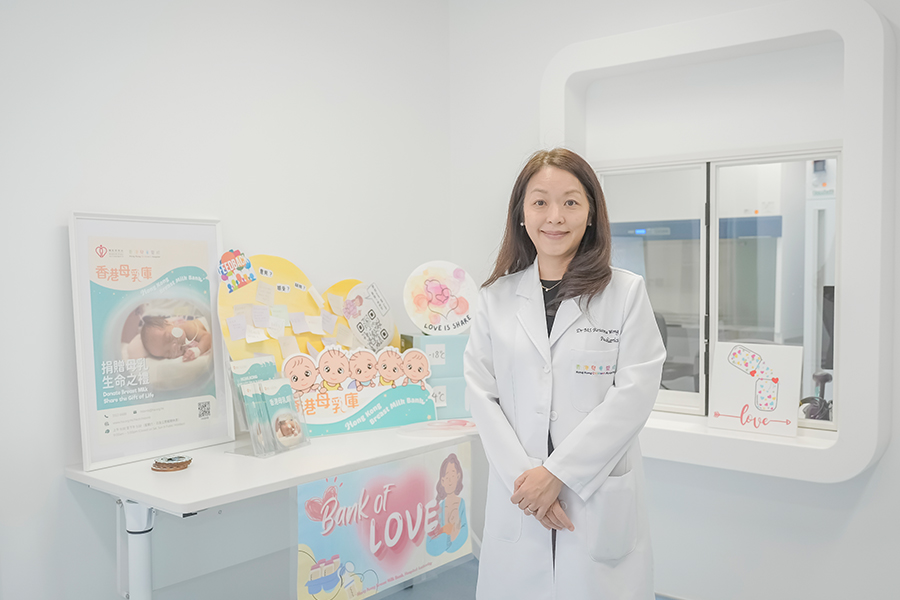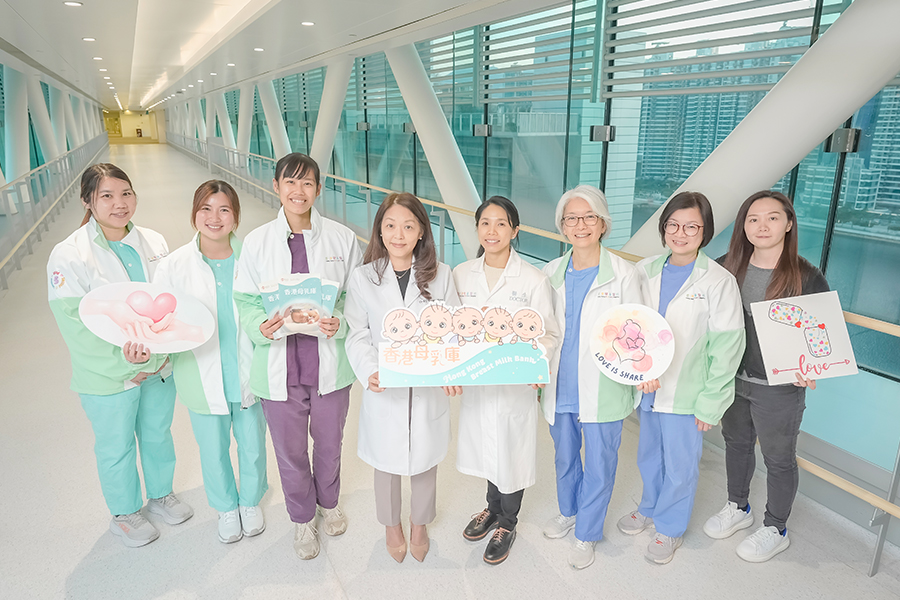Breast milk donation: A lifeline for preterm infants
 The arrival of a newborn baby always brings joy and hope. However, some babies are separated immediately from their parents and admitted to the Neonatal Intensive Care Unit (NICU) due to prematurity or serious congenital conditions that jeopardise their lives. In these cases, breast milk is nature’s miracle remedy that can save their lives. “Breast milk is rich in antibodies and easily absorbed by newborns, which reduces the risk of developing complications. For preterm or critically ill infants, breast milk is not just a nutritious food but therapeutic,” says the Director of the Hong Kong Breast Milk Bank (HKBMB) Dr Rosanna Wong. Recognising that some mothers struggle to produce breast milk or have an insufficient supply, the HKBMB has been established to provide quality breast milk to needy infants. “Breast milk donation is the best gift for preterm infants. It can save their lives,” Dr Wong explains.
The arrival of a newborn baby always brings joy and hope. However, some babies are separated immediately from their parents and admitted to the Neonatal Intensive Care Unit (NICU) due to prematurity or serious congenital conditions that jeopardise their lives. In these cases, breast milk is nature’s miracle remedy that can save their lives. “Breast milk is rich in antibodies and easily absorbed by newborns, which reduces the risk of developing complications. For preterm or critically ill infants, breast milk is not just a nutritious food but therapeutic,” says the Director of the Hong Kong Breast Milk Bank (HKBMB) Dr Rosanna Wong. Recognising that some mothers struggle to produce breast milk or have an insufficient supply, the HKBMB has been established to provide quality breast milk to needy infants. “Breast milk donation is the best gift for preterm infants. It can save their lives,” Dr Wong explains.
Therapeutic effects of breast milk
The gastrointestinal tract of preterm infants is not fully developed, resulting in poorer digestion than full-term infants. Easily digestible and absorptive breast milk therefore becomes their vital nutrition and medical support. “It is not uncommon for preterm infants to develop necrotising enterocolitis,” explains Dr Wong. “Surgery may be needed to remove the affected bowel, which may lead to short bowel syndrome. In severe cases, it could be life-threatening. Breast milk not only boosts babies’ immunity, but also reduces the risk of infection and enhances their chance of survival.”Not every mother is able to breastfeed. “Mothers feel worried to see their newborns admitted to the NICU. Not being able to stay close to them also makes breast milk production more challenging,” Dr Wong says. “Many mothers are unable to breastfeed because of mental stress or their own physical condition.”
Higher breastfeeding rate boosts breast milk donation
Dr Wong recalls that shortly after the Hong Kong Children’s Hospital opened, a baby with necrotising enterocolitis was admitted. The mother was emotionally distressed and unable to breastfeed. However, after the baby underwent surgery and began to recover, she started to produce more breast milk with nurses’ support. Delighted to learn about the establishment of the HKBMB, she offered support to comfort other NICU mothers and promote breast milk donation. Dr Wong found this gesture deeply moving.“The biggest challenge of breast milk donation is that the breastfeeding rate in Hong Kong is relatively low, making it harder to recruit mothers with surplus milk to donate,” Dr Wong reflects. “I am grateful to our excellent team, which includes nurses from obstetrics and paediatrics, as well as colleagues from maternal and child health centres. We are all working together to promote breast milk donation. I hope our efforts will increase the breastfeeding rate, which will directly benefit the HKBMB.”
 The HKBMB began receiving donations in January and, in the second phase of the launch, is expected to start providing donor breast milk to preterm and critically ill infants by March, contingent on sufficient donations.
The HKBMB began receiving donations in January and, in the second phase of the launch, is expected to start providing donor breast milk to preterm and critically ill infants by March, contingent on sufficient donations.
Who are eligible for receiving donor breast milk?
- Infants born at less than 32 weeks’ gestation
- Infants with a birth weight of less than 1,500 grams
- Infants with medical or surgical conditions that require donor breast milk
- Infants at the discretion of the NICU team head